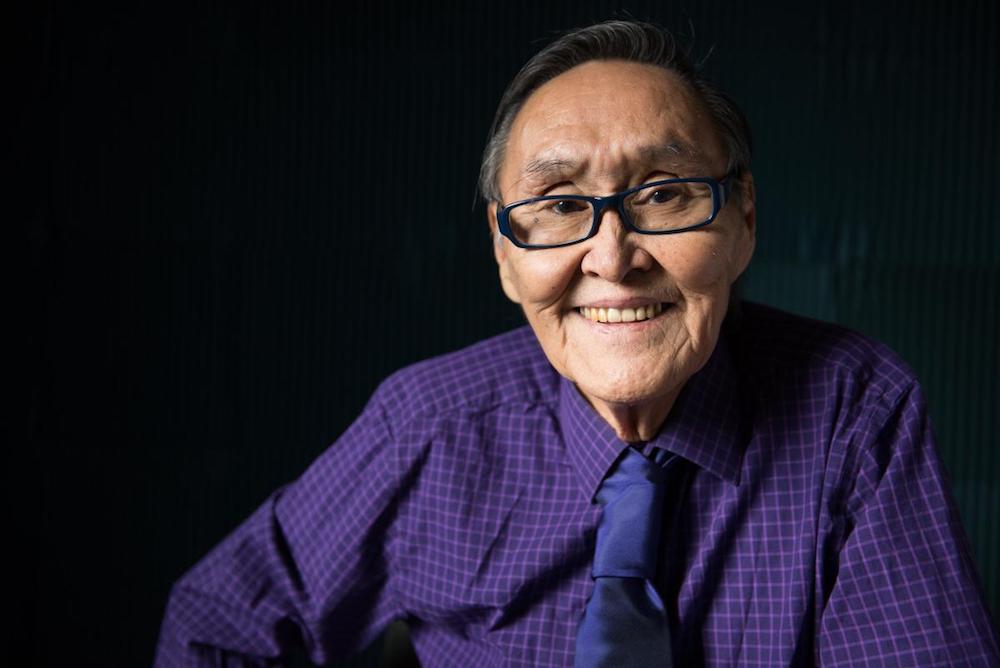John Active, a Yup’ik broadcaster and Alaska Native media pioneer, is dead at 69
Active became known through Alaska and even in the rest of the United States, for his efforts to preserve Yup'ik language and culture.

The first thing you noticed about John Active was his voice: soothing, yet authoritative. For a broadcaster on both television and radio, that was fortunate, for it made him immediately recognizable to those who heard him.
Active, who passed away on June 4 at the age of 69, used that voice in his mission to, as he would put it, “Yup’ify” the world. This often meant helping the staff at KYUK, the broadcaster in Bethel, Alaska, where he worked for 47 years, with passable pronunciation of words in the Yup’ik language. For the rest of us, insights into his culture came in flashes: short broadcasts about growing up Yup’ik, or spooky stories from the tundra. There was also the Word of the Week, broadcast originally over the airwaves and later available on YouTube, where the youngest generation was more likely to benefit from it.
Mostly though, his life’s work was dedicated to keeping people informed — and keeping his language, and culture alive. Officially, this was something he began doing in 1971, when he was asked to translate the day’s news from English (his first language) to Yup’ik (which he acquired as a child) over the radio.
But, in reality, he was simply harvesting the fruits of a seed had been planted in his youth by his adoptive grandmother (his mother died while he was an infant, and his father could not care for him) and other elders, who told him stories, and by his adoptive parents family, who took him camping out on the tundra, where he became educated as a Yup’ik.
“We learned about gathering edible plants and which ones were poisonous. We learned which and what kind of birds were around us by their calls,” Active recalled in a 2017 broadcast. “We learned everything about the Yup’ik subsistence lifestyle that we would never have learned in school.”
[Decades-old documentary films preserve snapshots of Alaska Native cultures]
Like all professionals, he developed a number of signatures. After the better part of five decades in the business, they became personal trademarks, immediately recognizable, even to those who couldn’t benefit from his Yup’ik broadcasts. In part, this was because both his easy-going style and the way his answers to even simple questions sounded like stories were personal traits, and were recognizable in either of his working languages.
He often appeared on statewide broadcasts, and he would, on occasion, get time in front of a national audience as well. This made him a familiar voice, but it was the times he spoke to his fellow Yup’ik that he always recalled most proudly.
“Everything that I do today, and on the radio, try to make people laugh, make them comfortable, is I’m trying to pass on what the elders taught to me by my actions, what I learned from them,” Active told an audience attending his retirement celebration this past March.
Beyond being broadcaster, Active also worked as a translator and interpreter. He was said to be among the few who could translate between the two languages on sight — conveying in Yup’ik what he was reading and hearing in English, and vice-versa. But he once credited his rare ability to the fact that he wasn’t really translating at all.
“I read it in English with my eyes – read along – and then I say it in Yup’ik. When I’m reading in English, I never translate anything,” he said in a 2015 interview with Alaska’s KTVA television.
[Yup’ik culture bearer shares the art of fur at Cama-i]
Even for a master of Yup’ik, competent in the language’s multiple dialects, he could still be challenged by concepts that had been introduced to Yup’ik. How does one explain terms like “computer” or “home equity”? Even if a word for a new term existed, they were often meaningless without proper explanation. If you were John Active, you told the story of the word, often taking a paragraph where English required just one or two words.
Active was probably best known for telling a story in Yup’ik at the start of each broadcast. The simple explanation for why he did this was that it was his way of keeping the Yup’ik culture living. Many of these stories, he said, had been handed down to him and he was doing his part to pass them on.
Active admitted, though, that he originally did it for his own sake, and without the knowledge of his non-Yup’ik speaking boss. Being in front of a mic that first time had made him terribly nervous, and telling a story was his way of calming himself. It was also, he found, a way of warming his audience up.
Active’s voice has now fallen silent, but he has left his fellow Yup’ik speakers capable of picking up where he left off.